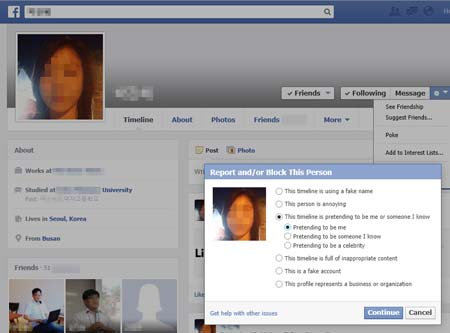- California Assembly OKs highest minimum wage in nation
- S. Korea unveils first graphic cigarette warnings
- US joins with South Korea, Japan in bid to deter North Korea
- LPGA golfer Chun In-gee finally back in action
- S. Korea won’t be top seed in final World Cup qualification round
- US men’s soccer misses 2nd straight Olympics
- US back on track in qualifying with 4-0 win over Guatemala
- High-intensity workout injuries spawn cottage industry
- CDC expands range of Zika mosquitoes into parts of Northeast
- Who knew? ‘The Walking Dead’ is helping families connect
Living someone else’s life
‘Identity theft’ increasing on SNS

An “identity theft” victim reports a Facebook page as owned by someone “pretending to be me.” Risks of identity theft are higher than ever as “thieves” steal photos and use them to create a virtual existence, assuming that the behavior is okay because they are not profiting from it, nor committing a serious crime. (Korea Times file)
By Kwon Ji-youn, Yoon Sung-won, Park Jin-hai
Property theft can easily be punished as long as evidence points in one direction, hopefully the right one. But what happens in cases of identity theft?
As the online community continues to grow rapidly, netizens are finding themselves hesitant about uploading personal information online, where it can be easily stolen with none being the wiser.
Some websites have developed strategies to prevent this from happening by disabling the right-click button and requesting users to place watermarks on their photographs, but stealing photos and another person’s life still isn’t all that difficult.
Another me
Kwon Hye-yoon, 25, received a phone call late one night, requesting that she meet a friend of a friend of hers, Kim. Her friend, Choe, wanted to introduce her to someone who he thought she would get along with well, so she accepted without hesitation.
The next night, when she met Kim, her jaw dropped at his first words.
“That’s not Hye-yoon! That’s Lucy!”
Kim explained that he had met a friend on Facebook named Lucy who looked uncannily like Kwon. Intrigued, Kwon asked to see the Facebook account and couldn’t believe what she saw.
The name read Lucy, but the photo was Kwon _ and at the bottom right corner of each photo was a watermark that read “Lucy.”
Kwon hurried home, created a second Facebook account with a different name and added Lucy. She looked through her profile photos _ they were all photos of Kwon.
Reading the captions, Kwon felt a chill down her spine. Lucy had stolen photos of Kwon and created another life for herself in cyber space. Under a picture of Kwon and her best male friend, Lucy had written, “Dear cousin, feel better!”
“The thing that scares me is that I would never have known if it weren’t for Kim,” Kwon said.
Kwon contacted Lucy to find out who she was and why she was stealing her photos. “I’m sorry,” was all she said.
Such cases are more common than people think. As more and more netizens actively engage in social networking sites and messenger services, the risks of fraud and phishing are higher than ever. But in the shadows of such acts of corruption are cases in which “thieves” steal photos and use them, albeit harmlessly, to create a virtual existence.
In many such cases, these people steal photos of other people without permission, post them on their blogs or social networking pages and live another’s life virtually, assuming that the behavior is okay because they are not profiting from it, nor committing a serious crime.
Lee Jin-a, 24, said that she has lived in horror ever since an anonymous message arrived on her Facebook account, saying that a total stranger was pretending to be her. Following the link on the message, she found a Facebook account that was a duplicate of hers.
“After reviewing this person’s page, I felt as though my whole life had been stolen,” said Lee.
Lee is nothing out of the ordinary, except that she has a pretty, small face and a well-balanced slim physique.
Like other girls her age, she posted pictures of her miscellaneous life events on her Facebook page, such as shots of her enjoying dinner at fancy restaurants or trying on new clothes.
“It is really creepy. It happened a month ago, but I still shudder at the thought of someone else pretending to be me. That person’s account had my profile photo, and had written down every detail of what I had done and where I had been.”
According to Lee, her identity thief had made some 100 new cyber friends using Lee’s picture. She had even been dating a cyber boyfriend for the past six months. Angered, Lee reported her case to Gangnam Police Station in southern Seoul, with a handful of evidence and a petition letter.
“To my surprise, I heard that I cannot sue the person on criminal charges, except for defamation. And even if I do, my chances of winning are slim to none, since the server is based in a foreign country, where local police investigations are limited,” Lee said.
“Plus, I figured that the cost and time to file the suit was more than I could afford. For now, I’ve almost given up,” she added.
But she said that she cannot understand this situation in which there is nothing that can be done for the psychological damage inflicted.
Why?
Regarding a series of identity theft cases reported in recent years, psychologists agree that those who steal others’ identity on social network sites by and large are less than satisfied with their lives.
Most people guilty of identity theft tend to be tempted by the “seemingly wonderful” life of others on SNS because they think that can fill the hollowness in their minds by living someone else’s life.
Another reason why they do so is that they tend to believe they can create an “ideal” version of themselves, someone they really want to be but who doesn’t actually exist.
Ha Ji-hyun, a professor of psychology at Konkuk University Hospital, said in a news report that identity theft incidents are closely related to the nature of SNS as an online venue where many of its users have a strong tendency to upload things that others may feel jealous about, such as the experience of going on exciting trips or tasting delicious food at fancy restaurants. They find satisfaction once other users show positive responses such as clicking the “like” button or leaving jealous comments.
On the other hand, users who don’t have things to brag about, or seldom get envious responses, feel a relative sense of deprivation.
Psychologists say that once they feel this, they crave compliments from others to compensate for the negative feelings. However, experts warn that in serious cases, such a vicious circle may lead to depression.
“These people who steal others’ identities resort to extreme measures to recover their confidence which has been lost due to deprivation,” Ha concluded.














